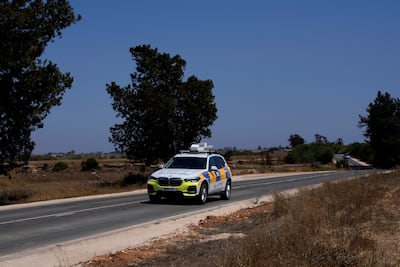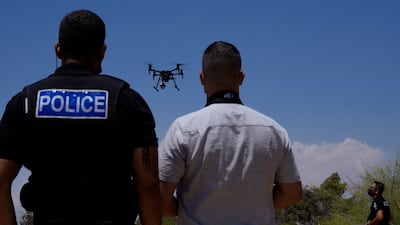Officials at a UK military base in Cyprus are stepping up surveillance operations and patrols as increasing numbers of migrants, mostly Syrians, are smuggled into the EU across the enclaves.
Customs officers carrying new thermal cameras are increasing their presence in the base territories, hoping to capture more smugglers and rescue migrants.
Cyprus is politically split between the Turkish north and the Greek south. Despite a UN-mandated military buffer zone there are ways to cross the island's border without a security check.
Adam Chatfield, head of customs and immigration at the British bases in Cyprus, said 24 officers use four SUVs and two thermal imaging cameras to patrol the 45-kilometre boundary with North Cyprus.
“People are paying a lot of money to be trafficked into Cyprus and there's a complete disregard to their safety," Mr Chatfield said. "So, providing and detecting traffickers is a key priority for us and we’ll continue to do so."
In 2018, the UK bases found 17 migrants trying to cross in six instances.
That jumped to 33 migrants in 16 crossing attempts a year later. Last year, 67 migrants were intercepted in nine attempted crossings.

According to the Cypriot government, 3,896 Syrians reached the country from Turkey in the past two years, usually flying into the north first.
“We’ve seen numbers crossing between 10 and 20 individuals. Sometimes we have no encounters in the month and other times we have one or two incursions,” Mr Chatfield said.
Cyprus was divided along ethnic lines in 1974 when Turkey invaded in the aftermath of a coup led by Greek Cypriots to unite Cyprus and Greece.
Turkish Cypriots in the northern part of the island declared independence nearly a decade later. Only Turkey recognises North Cyprus and Ankara maintains more than 35,000 troops there.
A buffer zone controlled by a UN peacekeeping force separates the north from the Greek Cypriot south, where the island’s internationally recognised government is seated.

Although Cyprus is an EU member, only the southern part enjoys the full benefits of membership.
Dhekelia Garrison, one of two military bases the UK retained after Cyprus gained independence from British colonial rule in 1960, is directly beside the north, along a strip of farmland.
Abandoned homes and empty fields offer many secluded routes for smugglers to bring their goods or for migrants to cross. There is not even a fence to separate the base from the north.
Dhekelia is one of two British Sovereign Base Areas on Cyprus, the other is Akrotiri further west, which are British Overseas Territories and under British jurisdiction.
The military bases, 253-square-km in total, have been used to launch air strikes against Isis in Syria and Iraq.
Mr Chatfield said a network of traffickers charges $5,000 a head to smuggle migrants into the south.
“Some come soaking wet, straight from the boat with nothing but the clothes on their back,” he said. “Detecting traffickers is a key priority for us and we’ll continue to do so.”
The authorities at Dhekelia Garrison have an agreement with the Cypriot government to transfer asylum seekers to the south, where their claims are processed.
Mr Chatfield said arrangements are made to return to North Cyprus those who do not apply for asylum.
Cyprus has accused Turkey of deliberately sending migrants in from the north, and has asked Frontex, the EU’s border agency, to step in and help.
The government says its ability to host more migrants has been stretched beyond its capacity to cope.


